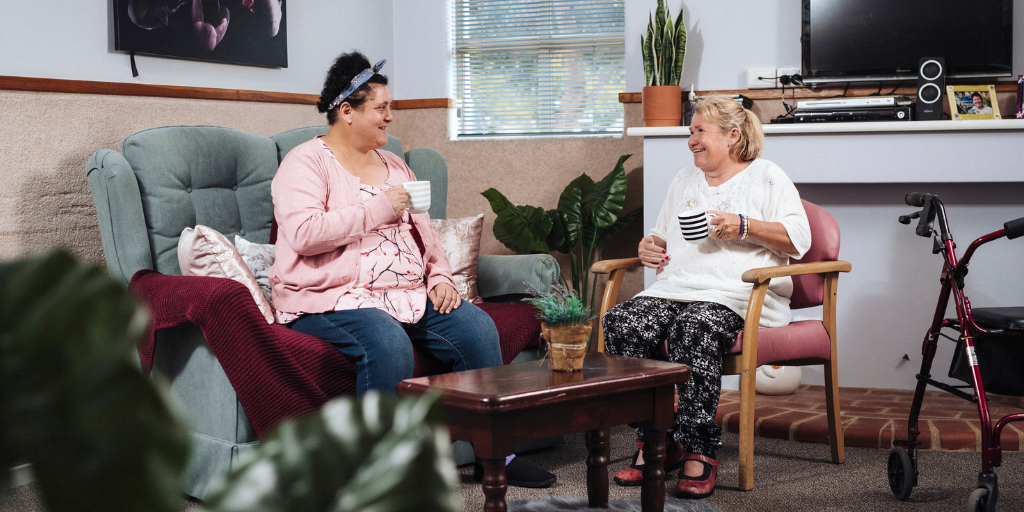
Not many people have a goal to enter residential aged care. Unfortunately, decisions about aged care often happen after a serious event which makes it impossible for a person to stay at home. With emotions running high, it can be an incredibly stressful way to make a decision.
If you have to make an unexpected decision about aged care, read on for advice and tips on how to do it.
Dealing with unexpected, life-changing events
The day Duncan Ridley’s life changed forever, his 64-year-old wife began to feel unwell while playing with their grandchildren. She went to bed early, the last decision she would make about her own care. Complications from treatment for an aneurysm left her with permanent disability that requires residential care.
Duncan’s personal experience is invaluable to Brightwater's Resident community. His advice for anyone dealing with making decisions under pressure is to be prepared.
Get end of life affairs in order
Duncan’s first hurdle was a legal one. He had to become legally authorised to make decisions for his wife.
“My wife had her aneurysm on a Thursday. I had to cancel an appointment we’d made with a solicitor for the next day to formalise our end of life plans.
“She was in no position to make any of those decisions, so I had to go through the process of applying to the State Administrative Tribunal to become her guardian and administrator.”
Once Duncan had legal authority to act on his wife’s behalf, he was able to make decisions about her care.
Consult with family members
Having a difficult conversation with family members might not be appealing, but it can help alleviate stress and provide support.
“We have three sons and they’re all very close to their mother,” Duncan said.
“We were all visiting her regularly. Between us, we worked out what needed to happen.”
Brightwater Senior Social Worker Amanda Wallace agrees with the importance of family consultation and including the person needing care in decision-making.
“One of the things I always, always do is involve the person,” Amanda said.
“Even if they don’t have capacity, they still have a right to know what’s going on.”

Gather information and get advice
Duncan immediately got in touch with My Aged Care and they provided him a handbook that listed residential aged care facilities. One of his sons had industry knowledge of residential aged care through his job. The same son had a former colleague who ran a residential care facility.
“Between my knowledge, my son’s knowledge, and the advice from his former colleague, the decision became a lot easier for us,” Duncan said.
“Getting advice so you can make an informed decision is critical.”
Weigh your options
Write a list of pros and cons for each option and then compare them. Writing things down ensures you haven’t forgotten anything. It can also show the drawbacks for an option aren’t nearly as bad as you imagined. The positive reasons might make your options more obvious.
“I went through the My Aged Care handbook and highlighted a number of residential care facilities within a reasonable distance from home and my family,” Duncan said.
“I’d given my sons the handbook of all the facilities so we could run through the options of each one.
“I made appointments to visit them, just to see whether they were the facility I wanted for my wife.”
Duncan invited his sons to accompany him on the facility tours. They ranked each facility on the shortlist after each visit.
Decide with confidence
Thinking clearly under pressure can be hard. Your first idea might not be the best one. Give yourself time to mull over your options so you can feel confident about your decision.
“We knew that if my wife was offered the position at the facility I ranked last, I didn’t have to accept it. I could say, ‘No, thank you very much. We’re going to decline it,’” Duncan said.
“Or, I could accept a position and move her at a later stage.
“I didn’t want to do that. But because I’d gone through and found out the information, I knew what I could and couldn’t do.
“It wasn’t a rushed process. I wasn’t making decisions on the fly.”
After a three month wait, Duncan was able to get his wife into the facility that ranked number one on his list.
“Getting the correct information is so important,” Duncan said.
“Because If you don’t have it, you’re not going to make the right choice.”



